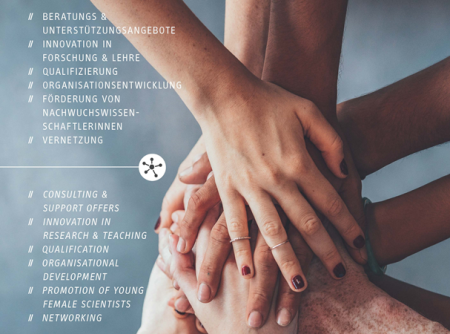Newsletter July 2020
Latest News |
|

|
Save your place now at COMETiN, the mentoring program for young female scientists at OVGU!
Then register for the next round of the COMETiN program. Here you will receive personal exchange with a mentor, workshops and coaching to support you on your way. The new round starts on October 27th, apply now at http://www.bfg.ovgu.de/COMETiN+Programm/Teilnahme.html |
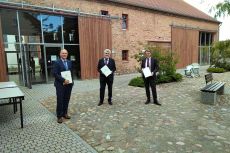
|
New target agreement for the OVGU
A new agreement on objectives was signed between the OVGU and the Ministry of Science, Economics and Digitisation of Saxony-Anhalt at the end of June. These agreements with the universities enable a modern management between the state and the universities and - together with the recently amended Higher Education Act of the state of Saxony-Anhalt - offer planning security, reliability and development opportunities for the state's higher education and science system. In terms of content, numerous tasks that were already the focus of the universities in the past five years will be pursued further. Among other things, the state parliament has regulated the abolition of the central job overviews and transferred personnel management to the autonomy of the universities. The topic of digitisation has gained significantly in importance and is more prominently anchored in the agreements. You can read the press release of the LRK on the website of the Landesrektorenkonferenz. |
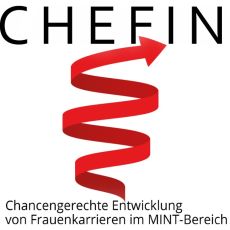
|
CHEFIN - Equitable development of women's careers in the MINT sector
In the project "CHEFIN - Chancengerechte Entwicklung von Frauenkarrieren im MINT-Bereich" (CHEFIN - Equal Opportunities for the Development of Women's Careers in the MINT Area), RWTH Aachen University and TU Dortmund University have developed an online tool for career counselling for female graduates and young women entering the MINT area. Despite many efforts, the under-representation of women in executive positions and the lack of equal opportunities on the way there are unfortunately still facts. This affects women from the MINT sector in particular: the proportion of women, which (here) is already very low anyway, decreases even further in the course of a career, and more so than in any other subject area. For these reasons, RWTH Aachen University and TU Dortmund University have made it their goal to support women from the MINT sector who are motivated to advance in their career planning. They combine qualitative and quantitative methods and thus research current success and inhibiting factors for the career paths of women in the MINT sector. The aim is to encourage female users in a currently still very male-dominated environment, to encourage them to plan their careers, to provide them with information based on their current studies and professional experience, and to show them the possibility of taking up a management position as an option. The online tool, which users can use on their own and which can also be integrated into coaching and counselling sessions, is free and freely available atwww.check-deine-karriere.de |
|
What is Corona doing to our mental health?
The Corona pandemic is currently affecting many areas of life. The Department of Psychiatry and Psychotherapy at the University Hospital Magdeburg is currently conducting an online survey to find out to what extent mental well-being is also affected by this crisis and on which factors this depends. The survey is open to all persons aged 18 and over. Dr. Sarah Wolter, representing her colleagues, answered some questions about the study in an interview. |
|
|
Nice to e-meet you!
In times of the Covid 19 pandemic, videoconferencing has proven to be an important tool to facilitate organisation and communication. In the best case, video calls bring us closer. In the worst case, they rob us of energy and make us reject this form of communication. In order for video conferences to succeed in the best possible way, Jun. Prof. Dan Verständig of the OVGU has created a netiquette for video conferences with the participants of his workshop during the days of digital teaching and has now also made it available for reading. to the handouts |
|
Grants and Prizes |
|
|
Call for Papers for the anthology "Paradoxes (in) Pedagogy" by Ulrich Binder & Franz-Kasper Krönig
It is now a standing doctrine that modern systems can no longer be described by grand traditional notions of nature or contract. Rather, their signatures are paradoxes as a condition, consequence or indicator of the autonomy of differentiation (see, for example, Münch 1984 for a systematic approach, Luhmann 1987 for a programmatic approach; Hagenbüchle & Geyer 2002 for a historical approach). That which can be recognized as a description of a society is merely the transcription of such paradoxes. In this way, various distinctions are produced, e.g. collective/individual, society/community, which in turn can then (temporarily) convince - sometimes again as a "great traditional idea". As is well known, this thesis is discussed again and again in relation to educational sciences, practices, organisations and professions. In an anthology, this tradition of pursuing the (allegedly) original, specific and functionally constitutive paradoxes of pedagogy will not only be continued, but also modified. There are four perspectives for this:
Contributions from all pedagogical areas are welcome! An exposé should be sent to ulrich.binder@ph-ludwigsburg.de and fkroenig@th-koeln.de by 1 September 2020. more |
|
|
Call for Papers for the conference "Materiality - Digitization - Education" on 25 and 26 February 2021 at the FernUniversität in Hagen
Does the digital sphere possess a materiality? Hardly any aspect has ever been of digitisation is often ignored, underestimated or questioned, such as the material character of the digital and the influence of materiality on digital media. From the user illusion of the screen to John Perry Barlow's (1996) declaration of independence of cyberspace - a domination-free space we could all enter 'disembodied' - and cyber-culture (Negroponte 1996) to online identities (Turkle 1995), which later became online profiles in social networks (boyd 2004). The digital, the virtual always formed a kind of counterpart to the materiality of the real, analog world. This dichotomy affects both educational theory formation and pedagogical practice, such as the juxtaposition of technologically sceptical and euphoric positions or the distinction between virtual and presence teaching. In contrast, there are examples in which the materiality of the digital has very 'real' effects: for example, a search query on Google costs about four watts of electricity per hour and causes two grams of CO2 emissions, digital homeschooling intensifies existing Educational inequalities and VR technologies release educational objects from their previous spatial and temporal location. These examples make it clear that materiality, digitisation and education are intertwined in many ways. The aim of the conference is to explore these complex interrelations from the perspectives of education, media, cultural and social sciences and to think further. The following topics and complexes of questions can be addressed:
On the one hand, theoretical contributions are welcome that are theoretically reflective or prognostic take a look at one of the outlined or related areas and discuss it critically. On the other hand, empirical contributions are welcome that present current findings on one of the present topics. The contributions should be designed in such a way that they are do not exceed a presentation time of 20 minutes. Afterwards there will be room for questions and discussions. Please send your abstract of max. 3,000 characters (plus bibliography and personal details) by September 1, 2020 to: materialitaet-digitalisierung-bildung@fernunihagen.de |
|

|
Maria Weber Grant for outstanding scientists
The Hans-Böckler-Foundation again announces the Maria Weber Grant for outstanding scientists in the postdoc phase. The target group are junior professors and post-doctoral students of all disciplines. Applicants can raise funds for one or two semesters to cover part of their teaching duties in order to create the necessary freedom for their research. The grant is endowed with 20.000€ per semester. The application deadline for the Maria Weber Grant is 15 September 2020. Further details on the funding and on how to apply can be found at https://www.boeckler.de/de/maria-weber-grant-2668.htm |
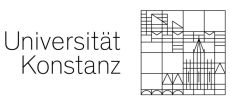
|
Call for Applications open now! 2-year postdoctoral internal and 5-year research
Apply now! The Zukunftskolleg at the University of Konstanz offers
Application deadline for all scholarships is 15 October 2020. More information on the application process can be found here |
Events |
|
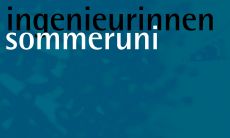
|
Online Summer Universities for Women in Computer Science and Engineering at the University of Bremen | July-September 2020
The 23rd Informatica Feminale and the 12th Female Engineering Summer University go online! The Informatica Feminale and the Female Engineering Summer University are a network of and for women. It is a place where technical and social changes that you encounter every day and which you, as female engineers, help to shape are exchanged. The offer of the two summer universities is aimed at female students of all types of universities and all subjects as well as women interested in further education. The summer universities comprise around 50 courses with subject content in engineering and computer science, ranging from introductory courses to basic and specialised subjects. Workshops on profession and career round off the programme. The range of topics includes courses on sustainability, materials, material and energy flows, modelling and data analysis, machine learning, image analysis, language processing, programming - for professionals and for beginners, gender and diversity in technology innovation, data protection and security, robotics and technical networks, database systems, operating systems, CAD modelling, IT in medicine, project and quality management, writing techniques, negotiation strategies, and gender and diversity skills in study and work. Teaching takes place in small groups by international lecturers from science and practice. The scope of the courses corresponds to at least one hour per week of the semester in block form. Participants can acquire certificates of achievement and credit points. The languages of instruction are German or English. Participants from universities and universities of applied sciences from Germany and abroad are expected. High-school graduates are also welcome. Participation in all courses in 2020 is free of charge for both female students and employed women. Registration is possible via the websites:
|
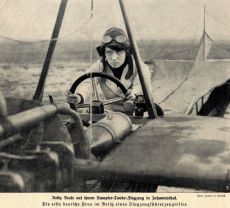
|
Interactive city walk: On the tracks of Melli Beese on 16 August 2020
The political and cultural life in Berlin has been and is shaped by strong, sensitive, courageous women who are forward-looking and have the spirit of the times. Who was Melli Beese? Her name doesn't mean anything to many people, but wrongly so, because she was the first woman in Germany to get her pilot's license against extreme resistance. Before that she had already trained as a sculptor in Sweden, as women were not yet admitted to German universities at that time. She did everything to realize her dream of flying. She also dreamed of taking flying out of its niche and establishing civil aviation. But the First World War put a damper on her plans. On the walk you will learn more about the life of this exceptional woman of that time and find answers to the questions: How can we today be inspired by her visionary power for our lives? What dreams are needed for the present and how can we contribute to their fulfilment? more |
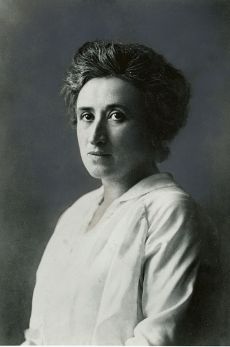
|
Interactive city walk: On the tracks of Rosa Luxemburg on 30 August 2020
In the series: Lifestyles - Places to live. Following the footsteps of women who have moved Berlin, this city walk takes you in the footsteps of the Polish Jewish revolutionary Rosa Luxemburg. She was one of the most important representatives of the German and international workers' movement at the beginning of the 20th century, and with her thoughts, her intrepid appearance and commitment to a fairer, more humane and peaceful world, she can encourage us to find our own way and commit ourselves to the burning political issues of the present. On the city walk you will walk through streets and places in Berlin that are connected to the life and work of Rosa Luxemburg. Besides the well-known biographical facts, you will also explore the more personal sides of the person behind this famous name. more |
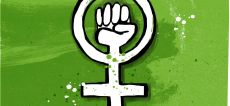
|
Democracy needs feminism! Confronting anti-feminism online on 31 August 2020
Attacks on gender and sexual diversity and feminist achievements are also increasingly coming to the fore online. Discussions about the introduction of marriage for all or the #metoo debate show this. Especially in the social media it becomes clear how important it is to show attitude, to oppose antifeminist arguments and to make gender-democratic positions visible. The two-hour online seminar offers an introduction to the topic. What is antifeminism anyway and how can we recognize it online? What strategies are there to react to antifeminist statements? Using typical antifeminist arguments, the participants will try out their own discussion strategies and positioning options. The online seminar alternates between audiovisual inputs and text-based discussion methods. A computer and Internet connection are required for participation, but no camera or headset. More information about the event can be found here |
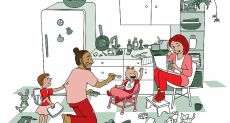
|
For a feminist time policy: Trade union views on systemic relevance and care work – Online conference from 11-12 September
This conference will examine the relationship between gainful employment and unpaid care work. It will discuss social transformation processes and the necessary upgrading of system-relevant care professions in education and upbringing. A change is taking place in the so-called women's occupations, partly because the younger generation has new ideas about life and work, gender and work, shared educational work and the relationship between wage and time policy. The specialist conference is designed in such a way that, in addition to lectures, it offers plenty of space for exchange and specialist in-depth discussion. Registration deadline is 12 August 2020. Information on the programme and registration formalities can be found here |
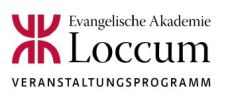
|
Digitisation, labour market and social security – Different effects for women and men? Online conference on 16 and 17 September 2020
Does digitisation bring new impulses for gender equality in the labour market? Or does it lead to a strengthening of traditional role allocations - as is much discussed with regard to the home office in the Corona crisis? Do new freedoms make it possible to combine gainful employment and life plans or do they undermine social security and collective bargaining processes? You are cordially invited to take part in the discussion of these questions in an online event. The Protestant Academy Loccum invites you to participate in the discussion of these questions in an online event. You can find the complete program here. There you will also find a link to the registration. |

|
Antifeminism - an ancient ideology and its role in modern struggles for equality |Ad hoc group at the 40th Congress of the German Sociological Association, 14-25 September 2020 in Berlin
Misogyny and antifeminism play a central role in the ideologies and attempts to mobilize anti-galitarian actors, networks and groups. This ad-hoc group will gather research that investigates contemporary misogynist and anti-feminist manifestations and their intertwining with other pejorative and anti-galitarian ideologies. The Ad-Hoc group will focus on anti-galitarian ideologies and address the central theme of the congress, "Society under tension", by looking at the defensive struggles against an open, egalitarian society. Antifeminism and misogyny, as bridge narratives, play a central but so far largely under-researched role in the struggles against egalitarian social designs. With changing social realities and norms towards a more egalitarian society, anti-feminism has also changed and common patterns of argumentation have shifted. Today there is no longer any warning that women's right to vote will lead to the decay of the patriarchally organised family. Instead, a modernised form of anti-feminist argumentation claims that gender equality has long since been implemented, and even more so that the gender order has long since changed. The aim of the ad hoc group is to bring different research approaches into an exchange. More information about the event can be found here |
University and Politics |
|
|
Powerful men - Fainting women?
Stone Age female artists, rich princesses from the Bronze Age and Viking women wielding axes actually existed. This is shown by more and more finds and scientific studies. A new generation of researchers* is uncovering archaeological errors with the help of the most modern analysis methods. The classic role models of men and women are being put to the test and are increasingly beginning to crumble. There are still many examples worldwide of how new or newly interpreted finds can change the view of gender roles. "Terra X" uncovers scientific errors, reports on current excavations and tells of the turning points that actually led to the discrimination of women. watch the video |
|
|
Newsletter of the bukof-Commission "Sexualised Discrimination and Violence at Universities"
Sexualised discrimination and violence in all areas of society is a predominantly taboo and often underestimated problem. Universities as working and unfortunately, training centres are not shelters in this respect. In order to keep the topic in mind and to provide information, the Commission "Sexualised Discrimination and Violence at Universities" publishes a newsletter about every six months. The Commission aims to reduce discrimination against women at university and in professional life through sexual discrimination and violence at universities. It is committed to the implementation of measures for prevention and the establishment of adequate intervention possibilities. You can find the current newsletter here |
|
|
Open Access Helpdesk launched
As part of the BMBF-funded "open-access.network" project, which was launched on 1 December 2019, an individual Open Access consultancy programme was launched. The "Open Access Helpdesk" (which can be contacted at https://open-access.net/informationen-zu-open-access/helpdesk) is primarily aimed at scientists who can obtain answers to their specific questions here. The three central aims of the project are to provide information, to impart skills and to network the existing community. To this end, an association of project partners has come together who bring with them comprehensive and diverse expertise in the provision of information, the development of competence and networking on OA and who have been very active contributors to the OA community for many years. In addition, the project staff have many years of experience in providing advice and can answer questions quickly and competently. You can find out more about the project here |
|
|
Recommendations for action Gender knowledge for the IT sector
Recommendations for action and best practices were published at the end of the joint project "GEWINN". They contain practical gender knowledge for the IT sector and show how companies can promote diversity. During the work in the real-world laboratories, five cross-cutting issues have emerged which played a role for companies from a gender perspective: "Employer Branding", "Networks", "Organizational Barriers", "Location and Industry" and "Resources". The "Best Practices" document the most important findings on these cross-cutting issues. During five specialist days in major German cities, core topics were dealt with: "Agility in software development", "Organizational cultures in IT", "New approaches in HR management", "Gender in algorithmic systems" and "Female IT talents: discover, promote, secure! The now published recommendations for action bundle the findings from the exchange of knowledge and experience on these topics. The "Best Practices" and recommendations for action are available for free download at www.gender-wissen-informatik.de/best-practice and www.gender-wissen-informatik.de/handlungsempfehlungen |
|
|
Gender Policy in Times of Corona - Results of a Survey of Women and Gender Equality Actors in Non-University Research Organisations and Universities
In May 2020, the Alliance of Gender Equality Officers of non-university research organisations (AGbaF) and bukof jointly conducted a survey of women and gender equality actors in non-university research institutions and universities. The reasons for this were the alarming findings about the increase in structural discrimination of women scientists and other status groups in the respective organisations since the beginning of the corona pandemic. The aim of the survey, which was launched in May 2020, was to obtain a solid database from the respective organisations on the gender equality situation and a basis for gender equality-oriented action through standardised questions and thus quantifiable feedback. The results of the survey can be found here |
|
|
Gender Equality out of the crisis?
A new issue of zwd-POLITIKMAGAZIN has been published. Due to the pandemic, this issue focuses on the situation of women in the corona crisis and ways out of the crisis. The cover story deals with the question whether politics will be able to ensure a gender-equitable handling of the corona crisis. zwd-editor Holger H. Lührig deals with various initiatives from science and leading women's organizations. They all demanded that the federal and state governments counteract the relapse into role stereotypes in families that were long believed to have been overcome as a result of the corona pandemic. In this context, the billion-euro economic stimulus package will also be examined from a gender policy perspective: To what extent are the government's measures actually aligned with the principle of "no state aid without the promotion of women" emphasised by Federal Minister of Family Affairs Franziska Giffey (SPD)? You can read about these and other interesting points in the current issue of zwd-Magazin digital. You can download the issue as a Pdf file here |
|
|
New information offer on gender equality and science on the CEWS portal
The topic page "Gender-related and sexualised violence in science" provides an overview of the international research literature, survey studies, resources and training materials, it refers to position papers and guidelines for science and provides information on the legal background of the situation in Germany. Since the topic is primarily researched in the Anglo-Saxon world, the linked texts, studies and other materials are primarily in English. This compilation follows a feminist understanding of violence, which includes non-physical acts of violence, for example sexist hate speech on the Internet. The target group of this collection of materials are institute and gender equality officers from scientific institutions, researchers from the social sciences and other scientists interested in the topic. Persons affected by violence and sexual harassment should contact counselling centres at their universities or research institutions or local counselling centres or the police directly. to the topic page |
|
|
Conflicting goals: What professors think about equality
Recognition in science is closely linked to the expectation of generating visible output in the form of highly ranked journal articles and third-party funding. According to the traditional self-image of the academic world, everyone is supposed to be equal before this expectation. Whether something in this self-image will change as a result of the experience of the pandemic is an open question. However, the supposedly gender-blind performance imperative seems to be so deeply rooted in the beliefs of this status group that a short- or medium-term change is very presuppositional. Within the framework of a study on gender equality knowledge and gender equality action by professors Ute Klammer, Lara Altenstädter, Ralitsa Petrova-Stoyanov and Eva Wegrzyn, 40 professors selected according to subject affiliation, research and committee experience were interviewed with the help of problem-oriented guidelines. The central question was: What do university teachers know about equality and how do they act accordingly? The interviews with the professors were accompanied by document analyses and interviews with gender equality experts at universities. about the results of the study |
|

Thank you very much for your interest! You are welcome to forward the newsletter. To register, please send a message to gleichstellungsbeauftragte@ovgu.deor register on the Website. |







